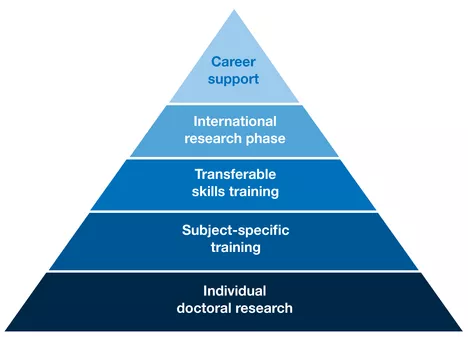TUM doctoral model
The Technical University of Munich (TUM) considers the goal-oriented training of early career researchers to be a core task. In order to create optimal conditions for doctoral candidates, the TUM Graduate School (TUM-GS), as a central scientific institution, has been bundling numerous initiatives specifically for doctoral candidates since 2009. In addition to individual research at the chair in close cooperation with the supervisor as the heart of the doctorate, other structuring qualification elements and networking opportunities offered by the TUM Graduate School in accordance with the best international standards offer great added value for doctoral candidates.
The best of both worlds

The traditional individual doctorate in Germany is based on close cooperation between the doctoral candidate and the supervisor at their chair or institute. Doctoral candidates work largely independently on their research project and are accompanied by their supervisor. At the same time, they are usually closely involved in the work of the chair. Doctoral candidates thus develop their identity as independent researchers at an early stage. This model is in contrast to the Anglo-Saxon Ph.D., which is more comparable to a postgraduate course of study, for which the dissertation is written in parallel.
The unique TUM doctoral model combines the valued academic freedom and independence of the traditional individual doctorate with structuring elements based on Ph.D. programs. As a combination of the best of both worlds, the TUM doctoral model supports you in completing your doctorate quickly and successfully on the one hand, and in further qualifying yourself according to your individual wishes and needs and networking internationally on the other.
The unique TUM doctoral model combines
Excellence in research: Individual research at a professorship or chair remains at the heart of the doctorate. Active involvement in the academic environment of TUM is also essential for doctoral candidates without a position at TUM.
Subject-specific qualification: Numerous offers for subject-specific qualification ideally complement and deepen the independent scientific work. The Graduate Centers offer a wide range of subject-specific further qualifications - from colloquia to statistics and software seminars to summer/winter schools and workshops on a wide range of topics.
Transferable skills training: The extensive transferable skills training course program prepares doctoral candidates in the best possible way for professional challenges during and after their doctorate. Each semester, we offer over 70 courses in five different categories (e.g. Personal Development or Skills for Science & Beyond) to meet the individual needs of doctoral candidates.
International experiences: Various TUM-GS funding schemes enable early international and intercultural collaboration in research and the development of personal and institutional networks. In particular, our Joint Supervision and Research Exchange Programs with renowned TUM partner universities (e.g. University of Queensland, Brisbane, Australia) allow for longer stays and intensified integration into global research networks.
Career counseling: TUM-GS offers tailor-made counseling services to optimally prepare for a career in science, industry and other fields - e.g. as part of the Attract2HM project, which is designed for doctoral candidates who are aiming for a HAW professorship.
